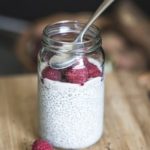
You may have been told that breakfast is the most important meal of the day. But is that really true? And what should you be eating? Glenville Nutrition explains more and shares 8 favourite breakfast ideas.
Benefits of breakfast
About 80% of us eat breakfast every day. There is a good body of research linking eating breakfast to a wide range of benefits, ranging from lower weight, improved brain function and concentration to reduced risk of diabetes and cardiovascular disease. Eating breakfast is also associated with improved brain function, including better concentration and memory.
Part of the benefit may be that people who eat breakfast also have other better dietary and lifestyle habits. For example, many people who skip breakfast go on to eat larger meals later in the evening, which can contribute to weight gain. Another benefit may be that many good breakfast options increase fibre intake in the diet.
However, a recent review in the British Medical Journal claimed that the benefits of eating breakfast on weight loss may be overstated in the long term and simply a reflection of overall healthier eating habits.
What about intermittent fasting?
Intermittent fasting is generating lots of interest at the moment. One way of doing this is to fast for 12 – 16 hours overnight on a daily basis, eating an earlier evening meal and a later breakfast. While research in still in progress, there are lots of reported health benefits, including weight loss and lower risk of diabetes due to lower insulin levels, improved heart health, cholesterol levels and blood pressure, improved brain health and even reduced risk of cancer.
However, it is not suitable for everyone. People with certain underlying medical conditions including diabetes should check with their GP or nutritionist before trying it. Some people are very sensitive to blood sugar fluctuations and may get ‘hangry’, running out of steam and reaching for less healthy options later in the day if they do not have a good breakfast. In addition, if you skip breakfast completely, you may struggle to get enough fibre, vegetables and fruit into your diet.
If you want to give intermittent fasting a try, we recommend having dinner by 7pm and not eating anything else until 7 or 9am, then starting with a healthy breakfast. This gives you a fasting window of 12 – 14 hours.
Who does need to eat breakfast?
- Athletes or people who are going to be completing longer bouts of exercise or physically intensive jobs in the morning benefit from eating breakfast. Including carbohydrates can generate energy more quickly than burning fat and if you are exercising soon after eating, focus on getting carbohydrates in e.g. a banana rather than fibre or fat.
- Many studies show that school children demonstrate better concentration and focus and perform better at tests when they eat breakfast so if you have kids, try to ensure they have a good breakfast before they leave for school
Ultimately, it depends on…
- Individual requirements – we are all different. If you are not hungry in the morning, review what you are eating the evening before. It may be that you are eating too late or having a late snack. In that case, it may be better for you to drop the snack and eat breakfast instead.
- What you eat for breakfast! Skipping breakfast may be better for you than eating a double chocolate muffin, but less beneficial than eating a wholegrain cereal.
Breakfast ‘do’s’
The basic formula for breakfast: Eat slow release (complex) carbs like oats and wholegrains with protein, like yoghurt, eggs or nuts. The carbs give your body energy to get started and your brain the fuel it needs to take on the day. Protein gives you staying power and helps you feel full until your next meal.
Breakfast is a great opportunity to up your fibre intake, so include wholegrain cereals or bread, nuts, seeds or veggies
Try savoury breakfast options like eggs or smoked salmon and avocado
Plan ahead and get your breakfast ready the night before to save time in the morning. Having breakfast before you leave the house or bringing it with you to work can help you to resist the muffins and pastries you might have to pass on your way to your desk
Breakfast ‘don’ts’
- Avoid juices and fruit smoothies. These are high in ‘free’ sugars, for example a 250ml smoothie often contains 7+ tsp of sugar. Eating a piece of fruit is always a better option
- Watch out for wolves in sheep’s clothing! Many breakfast options may be marketed as wholegrain or natural, but can still be high in sugar, with many exceeding total added sugar guidelines for the day. Cereals and yoghurts are especially guilty of this, and those marketed to children are often the worst. Check the labels and if sugar is listed in the top 5 ingredients, avoid.
- If you add sugar to your cereal, try swapping it for fruit or ½ tsp cinnamon
In summary….
What we eat is as important as when we eat. Most of us are likely to benefit from eating an earlier dinner, giving our digestion a break overnight and eating a healthy breakfast in the morning, containing complex (slow release) carbs and protein. Eating in this way helps to optimise energy, brain function and health.
8 breakfast suggestions
These breakfast ideas can all be prepared in less than 5 minutes or made the night before
- 1 slice wholegrain bread, 2 scrambled eggs, spinach or other vegetables
- Ryvita or rye bread, smoked salmon, ½ avocado, cucumber
- Porridge with natural yoghurt, chopped fruit, 1 tbsp ground seeds
- Natural full fat / Greek yoghurt with fresh berries and 2 tbsp. low sugar granola
- Chia berry breakfast pot
- Apple cinnamon overnight oats
- Slice wholegrain soda bread with nut butter and sliced banana or berries
- Pina Colada breakfast smoothie

